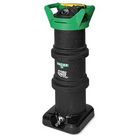What is pure water?
Pure water is water in its purest form. Pure water can be obtained from tap water simply by filtering with special systems. Filtering removes solids such as minerals, iron, manganese and other contaminants from water. One common method of removing impurities from water is to use mixed-bed resin filters. These are the type of filters used in the DI (deionisation) filter system.
How the DI filter works
The minerals in water are also known as TDS, or total dissolved solids. Due to the "calcification" caused by these minerals, windows also have to be wiped and polished when not using the pure water method. You can cut out these work steps and significantly improve your cost calculations by demineralising the water you use to clean the windows. In other words: for streak-free, residue-free results, all minerals must be completely removed from the water. The DI filter system uses an ion exchange process to remove all minerals from the water, leaving behind a mineral content of 0 ppm (parts per million) and producing 100 percent pure water. The deionisation process acts like a magnet, pulling all the dirt particles out of the water. Result: pure water of the highest quality.
One hundred percent pure water thanks to the HydroPower Ultra DI filter
The UNGER HydroPower Ultra pure water filter instantaneously produces 100 percent pure water. When water flows through the ion exchange resin in the Ultra Resin Packs, all the solid particles in the water are bound to the resin. Only after this process can the water be described as completely demineralised, thus guaranteeing clear, chalk-free surfaces. The initial investment in the HydroPower Ultra DI filter system is relatively low. The only follow-up costs result from replacing the Ultra Resin Packs after they have filtered a certain amount of water.
You can use all the water you filter, and the filters are easy to transport and ready to use at any time. During the demineralisation process, the ion exchange resin becomes saturated with minerals. The lifespan of the resin depends on the hardness of the water. The softer the water, the longer the resin lasts. In particular, the water hardness and the hydrogen carbonate content of the water you put through the system have a strong influence on the amount of pure water you can filter. Finding the right pure water filter for your individual needs is easier than you think. By simply providing a few details, customers can take advantage of UNGER’s online ROI calculator, which provides an automated recommendation for a professional device. In addition, the calculator calculates how much the filter could save you, and shows an overview of the costs you could reduce.
Where can DI filter systems be used?
Pure water filters are recommended for areas with soft or medium water. The small deionisation filter is ideal for working environments where space is limited, for occasional use or for use by beginners. The large pure water filter is suited to larger work surfaces and regular use. Cleaning with pure water is even safer when combined with the professional UNGER nLITE water-fed pole system.
The system enables you to reach high windows on upper floors with both feet firmly on the ground, thus avoiding the need for ladders or lifting platforms and the associated rental costs.
Tips when using pure water for the first time
In order to completely remove all dirt from glass surfaces when using pure water, you need to clean them very thoroughly the first time and rinse them afterwards. Always clean from top to bottom, because if you move the dirt upwards it gets stuck.




